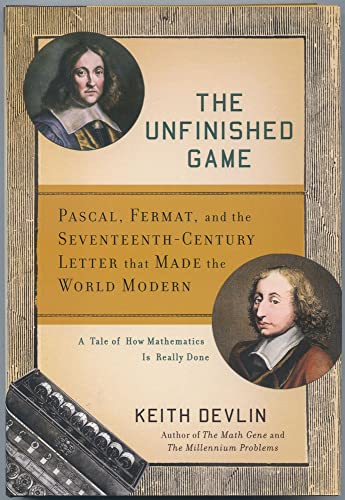Verwandte Artikel zu The Unfinished Game: Pascal, Fermat, and the Seventeenth-Cen...
The Unfinished Game: Pascal, Fermat, and the Seventeenth-Century Letter That Made the World Modern (Basic Ideas) - Hardcover

Inhaltsangabe
Before the mid-seventeenth century, scholars generally agreed that it was impossible to predict something by calculating mathematical outcomes. One simply could not put a numerical value on the likelihood that a particular event would occur. Even the outcome of something as simple as a dice roll or the likelihood of showers instead of sunshine was thought to lie in the realm of pure, unknowable chance. The issue remained intractable until Blaise Pascal wrote to Pierre de Fermat in 1654, outlining a solution to the unfinished game problem: how do you divide the pot when players are forced to end a game of dice before someone has won? The idea turned out to be far more seminal than Pascal realized. From it, the two men developed the method known today as probability theory. In The Unfinished Game, mathematician and NPR commentator Keith Devlin tells the story of this correspondence and its remarkable impact on the modern world: from insurance rates, to housing and job markets, to the safety of cars and planes, calculating probabilities allowed people, for the first time, to think rationally about how future events might unfold.
Die Inhaltsangabe kann sich auf eine andere Ausgabe dieses Titels beziehen.
Über die Autorinnen und Autoren
Keith Devlin is a Senior Researcher at Stanford University's Center fot the Study of Language and Information and it's executive director. He is also a consulting professor in the Department of Mathematics at Standfored University.
„Über diesen Titel“ kann sich auf eine andere Ausgabe dieses Titels beziehen.
Gratis für den Versand innerhalb von/der USA
Versandziele, Kosten & DauerNeu kaufen
Diesen Artikel anzeigenEUR 28,91 für den Versand von Vereinigtes Königreich nach USA
Versandziele, Kosten & DauerSuchergebnisse für The Unfinished Game: Pascal, Fermat, and the Seventeenth-Cen...
The Unfinished Game: Pascal, Fermat, and the Seventeenth-Century Letter that Made the World Modern
Anbieter: ThriftBooks-Dallas, Dallas, TX, USA
Hardcover. Zustand: Very Good. No Jacket. Missing dust jacket; May have limited writing in cover pages. Pages are unmarked. ~ ThriftBooks: Read More, Spend Less 0.78. Artikel-Nr. G0465009107I4N01
Anzahl: 1 verfügbar
The Unfinished Game: Pascal, Fermat, and the Seventeenth-Century Letter that Made the World Modern
Anbieter: ThriftBooks-Atlanta, AUSTELL, GA, USA
Hardcover. Zustand: As New. No Jacket. Pages are clean and are not marred by notes or folds of any kind. ~ ThriftBooks: Read More, Spend Less 0.78. Artikel-Nr. G0465009107I2N00
Anzahl: 1 verfügbar
The Unfinished Game: Pascal, Fermat, and the Seventeenth-Century Letter that Made the World Modern
Anbieter: ThriftBooks-Dallas, Dallas, TX, USA
Hardcover. Zustand: Very Good. No Jacket. Former library book; May have limited writing in cover pages. Pages are unmarked. ~ ThriftBooks: Read More, Spend Less 0.78. Artikel-Nr. G0465009107I4N10
Anzahl: 1 verfügbar
The Unfinished Game: Pascal, Fermat, and the Seventeenth-Century Letter that Made the World Modern
Anbieter: ThriftBooks-Dallas, Dallas, TX, USA
Hardcover. Zustand: Very Good. No Jacket. May have limited writing in cover pages. Pages are unmarked. ~ ThriftBooks: Read More, Spend Less 0.78. Artikel-Nr. G0465009107I4N00
Anzahl: 1 verfügbar
The Unfinished Game: Pascal, Fermat, and the Seventeenth-Century Letter that Made the World Modern
Anbieter: ThriftBooks-Atlanta, AUSTELL, GA, USA
Hardcover. Zustand: Very Good. No Jacket. May have limited writing in cover pages. Pages are unmarked. ~ ThriftBooks: Read More, Spend Less 0.78. Artikel-Nr. G0465009107I4N00
Anzahl: 1 verfügbar
The Unfinished Game: Pascal, Fermat, and the Seventeenth-Century Letter that Made the World Modern
Anbieter: ThriftBooks-Reno, Reno, NV, USA
Hardcover. Zustand: Very Good. No Jacket. May have limited writing in cover pages. Pages are unmarked. ~ ThriftBooks: Read More, Spend Less 0.78. Artikel-Nr. G0465009107I4N00
Anzahl: 1 verfügbar
The Unfinished Game: Pascal, Fermat, and the Seventeenth-Century Letter that Made the World Modern
Anbieter: ThriftBooks-Atlanta, AUSTELL, GA, USA
Hardcover. Zustand: Good. No Jacket. Pages can have notes/highlighting. Spine may show signs of wear. ~ ThriftBooks: Read More, Spend Less 0.78. Artikel-Nr. G0465009107I3N00
Anzahl: 1 verfügbar
The Unfinished Game: Pascal, Fermat, and the Seventeenth-Century Letter that Made the World Modern
Anbieter: Wonder Book, Frederick, MD, USA
Zustand: As New. Like New condition. Like New dust jacket. A near perfect copy that may have very minor cosmetic defects. Artikel-Nr. Y12B-02965
Anzahl: 1 verfügbar
The Unfinished Game : Pascal, Fermat, and the Seventeenth-Century Letter That Made the World Modern
Anbieter: Better World Books, Mishawaka, IN, USA
Zustand: Good. 1st Edition. Used book that is in clean, average condition without any missing pages. Artikel-Nr. 4357568-6
Anzahl: 1 verfügbar
The Unfinished Game : Pascal, Fermat, and the Seventeenth-Century Letter That Made the World Modern
Anbieter: Better World Books, Mishawaka, IN, USA
Zustand: Very Good. 1st Edition. Used book that is in excellent condition. May show signs of wear or have minor defects. Artikel-Nr. 6017704-6
Anzahl: 1 verfügbar

